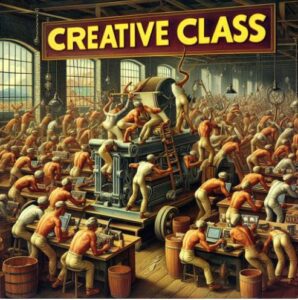 Big Tech companies switched political sides in 2024 because they’re scared. They’re deeply involved in the Great Game of AI and don’t want anyone to tell them what they can or can’t do. (Illustration from Canva.)
Big Tech companies switched political sides in 2024 because they’re scared. They’re deeply involved in the Great Game of AI and don’t want anyone to tell them what they can or can’t do. (Illustration from Canva.)
The Great Game has existed in tech since before I became a reporter. From operating systems to GUIs, from web browsers to Cloud, technology has run on the 90-9-1 principle. The winner gets 90% of the new niche’s profits, the second player gets 9%, and everyone else scrambles. The good news is there are lots of new niches.
The costs of the game rise with each turn of the wheel. The risk of failure is existential, as Intel has learned most recently. In the cloud a decade ago, $1 billion/quarter in cash was just the ante, the chip you threw in before the cards were dealt. In 2025 Microsoft plans to put $53 billion into capital spending. Most of this money is going into infrastructure, into Nvidia chips, data centers, and fiber lines. If you want to play, you’ve got to pay.
Great companies like IBM, AT&T, and GE faded into irrelevance over the last decade for lack of cash. All three were built with debt, and maintaining their stock prices required expensive dividends. Free cash flow wasn’t available to them, as it was to newer players like Google, Amazon, and Meta. There’s no alternative to cash for the merchandise.
AI is straining the balance sheets of even the Cloud Czars. That means increasing cash flow is paramount. You add cash flow by getting new customers, raising prices, and cutting costs. The Czars are doing all three aggressively.
Screw Everyone

When capital is squeezing labor like that, it can’t afford political push-back of any kind. Ever since the costs of the new game became clear, companies like Meta and Amazon have been moving to the right. Some do it noisily, others obsequiously, still others as quietly as possible. They’re all doing it because failure to do so will be seen as disloyal to the new masters, and it’s the only way to dump political interference.
The Creative Class, which supported Democrats through the first quarter of the century, has been knocked on its heels by all this. But their voices are no longer heard, and in many cases their work is no longer necessary. AI researchers who once toiled in obscurity are now heading up giant companies, and only those young graduates who convince them they know how to play the new game are welcome.
Winning the Game

The Cloud Czars must build compelling AI models, knowing only a few will survive. At the same time, they must buy the new infrastructure, using as much Nvidia gear as necessary, but adding their own chips to maintain some control over the outcome.
Big software companies like ServiceNow are in a similar position. Their costs are skyrocketing. They’re the customers for the new data center builds. They must overhaul their stacks and tell customers they’re “AI-driven” to raise prices and keep their places.
Then there are the start-ups, who are in the best position of all. With just a few AI buzzwords to make you swoon, they have the chance to become the next Amazon (founded in 1995), the next Google (founded in 1997) or the next Meta (founded in 2004). Even partial success can make you a Jack Clark, a former reporter who now stands on the cusp of becoming a billionaire at Anthropic.
What About You?
It’s impossible to predict just how many jobs will be “replaced,” or in fact how many more will be upgraded, as this all shakes out. The Big Tech hype machine is telling the public that scientists, writers, programmers and all kinds of managers are about to become redundant. This should not be a surprise, as travel agents, real estate brokers, insurance agents, taxi drivers, and even fast food clerks were made redundant in previous waves of technology.
In the end anything that can be done by a computer will be. The good news is we keep finding things that can’t be done by computers. We will continue to do that. But the Great Game of AI should teach all workers, especially the educated, an important lesson. Don’t trust your boss. Don’t take their word for anything. Protect yourself. Organize as necessary. You’re going to lose a lot of battles over the next few years and take a lot of hits.
You’re labor, not management. Act like it.









